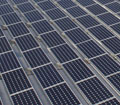As building owners and the public continue to embrace—and demand—sustainable construction, it's up to the construction industry to produce materials that will be used for environmentally friendly homes and buildings. The roofing industry, in particular, is producing recycled, biodegradable and sustainable components for roof structures, decks and coverings.
With the continued trend toward construction that helps minimize detrimental environmental effects and support the built environment's sustainability, construction industry professionals are beginning to look for objective evidence to verify claims about products' sustainability. Roofing contractors who install sustainable roof systems must have a reliable method to determine whether the roofing materials they select truly are sustainable.
To address this need, in late 2008, the International Code Council®'s (ICC's) subsidiary, ICC Evaluation Service (ICC-ES), introduced the Sustainable Attributes Verification and Evaluation™ (SAVE) Program.
The SAVE Program gives manufacturers the opportunity to have a single source—ICC-ES—evaluate their products and verify the products' sustainability. Upon successfully completing an ICC-ES SAVE Program evaluation, a building product or material is issued a Verification of Attributes Report™ (VAR). VARs are available on the ICC-ES SAVE Program's Web site, www.icc-es.org/save, for construction industry professionals, homeowners and building owners who are interested in identifying sustainable products.
The process
To obtain a VAR, a manufacturer first must review the SAVE Program's guidelines for verifying attributes to determine whether its product is within the scope of one or more of the nine guidelines provided on the program's Web site.
Next, the manufacturer must complete an application and submit the required fees and supporting data (which also can be done via the program's Web site).
After ICC-ES receives an application package, it is reviewed by an ICC-ES Customer Relations Team and forwarded to an ICC-ES technical staff member for evaluation. The initial technical data review typically is performed within 15 business days after ICC-ES receives a completed application package. The technical staff member then will work with the applicant toward verifying the product's claimed sustainable attributes.
The time required to complete a product evaluation varies depending on the completeness of documentation and time it takes to submit any necessary additional data, as well as the scope of evaluation requested. When a product successfully completes an evaluation, a VAR is published on the ICC-ES SAVE Web site in the Directory of Reports, which is available to contractors, designers, specifiers, code officials and consumers.
Program scope
The SAVE Program currently evaluates products, materials and systems that are within the scope of one or more of the following nine categories:
- EG101—Evaluation Guideline for Determination of Recycled Content of Materials, which uses a review of quality-control documentation as the basis for verifying a product's post- and pre-consumer recycled content
- EG102—Evaluation Guideline for Determination of Biobased Material Content, which uses results of testing performed in accordance with ASTM D6866-04, "Standard Test Method for Determining the Biobased Content of Natural Range Materials Using Radiocarbon and Isotope Ratio Mass Spectometry Analysis," or testing that establishes compliance with the minimum biobased content of the U.S. Department of Agriculture (USDA) Designation of Biobased Items for Federal Procurement (7 CFR Part 2902) to determine whether a product can be verified in this category. This guideline also can be met by providing documentation of compliance with the USDA Certified Biobased Product program's requirements.
- EG103—Evaluation Guideline for Determination of Solar Reflectance, Thermal Emittance and Solar Reflectance Index of Roof Covering Materials, which is based on ASTM C1549-04, "Standard Test Method for Determination of Solar Reflectance Near Ambient Temperature Using a Portable Solar Reflector," or ASTM E903-96, "Standard Test Method for Solar Absorbance, Reflectance, and Transmittance of Materials Using Integrating Spheres," for verifying a product's solar reflectance (ASTM E1918-97, "Standard Test Method for Measuring Solar Reflectance of Horizontal and Low-Sloped Surfaces in the Field," is an acceptable alternative for roof coverings intended for use on roof decks with slopes of 2-in-12 [9 degrees] or less).
EG103 verifies a product's thermal emittance based on ASTM C1731, "Standard Test Method for Determination of Emittance of Materials Near Room Temperature Using Portable Emissionmeters," or ASTM E408-71, "Standard Test Methods for Total Normal Emittance of Surfaces Using Inspection-Meter Techniques." EG103 also provides an option for Solar Reflectance Index calculations in accordance with ASTM E1980. EG103 can be used to establish that a roof covering material complies with the provisions for minimizing the heat island effect, such as those contained in the U.S. Green Building Council's Leadership in Energy and Environmental Design® (LEED) NC SS Credit 7.2 or the Green Globes® system, and is equivalent to the requirements of Section 602.13 of ICC 700 (The National Green Building Standard), as well as California Title 24, Part 6, Section 118. - EG104—Evaluation Guideline for Determination of Regionally Extracted, Harvested or Manufactured Materials or Products, which uses a review of quality-control documentation as the basis for verifying raw material sources and/or manufacturing location
- EG105—Evaluation Guideline for Determination of Volatile Organic Compound (VOC) Content and Emissions of Adhesives and Sealants, which contains test requirements for determining the VOC content of a wide variety of adhesives and sealants used on buildings' interiors
- EG106—Evaluation Guideline for Determination of Volatile Organic Compound (VOC) Content and Emissions of Paints and Coatings, which contains test requirements for determining the VOC content of paint or coating types used on buildings' interiors
- EG107—Evaluation Guideline for Determination of Volatile Organic Compound (VOC) Content and Emissions of Floor Covering Products, which contains test requirements for determining the VOC content of floor covering types
- EG108—Evaluation Guideline for Determination of Formaldehyde Emissions of Composite Wood and Engineered Wood Products, which contains test requirements for determining formaldehyde emissions of finished wood and wood-based products
- EG109—Evaluation Guideline for Determination of Certified Wood and Certified Wood Content in Products, which contains requirements for documentation to verify the wood content source and certification method
SAVE Program evaluations are based on requirements in the applicable evaluation guidelines and include (when applicable) inspecting the manufacturer's production process and product testing at recognized laboratories. SAVE Program evaluations address a product's or system's production stages beginning with raw materials acquisition and progressing through final manufacturing and packaging.
Growing green value
The SAVE Program is structured to benefit manufacturers, contractors, specifiers, designers and code officials and is designed for use under current major green building rating systems, such as LEED's Green Building Rating System™ and Green Globes.
Although these rating systems currently do not require independent proof supporting sustainable attributes claims, practitioners and manufacturers increasingly are demanding independent validation and verification to guard against "green washing," or unsubstantiated claims about products' environmental benefits.
ICC-ES technical staff currently is evaluating several products' sustainable features and has received numerous requests for more information from other manufacturers who are interested in obtaining product evaluations.
For more information about the SAVE Program or to apply for a SAVE product evaluation, visit www.icc-es.org/save, call (800) 423-6587, ext. 3447, or e-mail sustainable@icc-es.org.
Steven R. Thorsell, AIA, CSI, is ICC-ES's director of special products.



